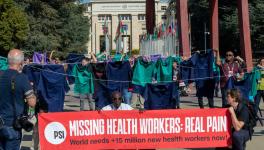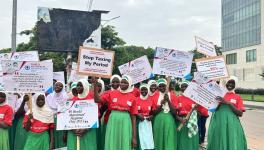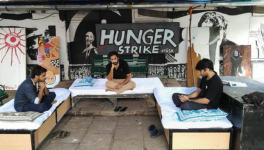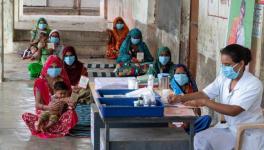In Ghana, Women Bodybuilders Changing the Narrative
They are seen as sturdy, muscular, and a threat to masculinity when they walk the streets of Ghana.
Seeing Ghanaian women with brawn and muscles bothers a section of the population. Still, these ladies are determined to change the narrative irrespective of how emasculated men might feel or how disgusted some women might feel.
"When my body started transforming because it was so new to people, I always covered my body. But now, I wear my booty shorts, I wear my sleeveless and walk around. I mean people are going to stare and I will make it worth their while, like yeah, you should stare. This is me, and this is who I am. I love me, and I have accepted who I am, and it's something I'm doing intentionally," Mary Nyarko Omale, a professional bodybuilder in Ghana, told DW.
The sport of bodybuilding has been thriving in Ghana for decades, primarily among men. It is common to see men lifting dumbbells and doing pushups on the streets and in gyms.
When women participate, disparaging looks and remarks are meted out to demoralize them. But there are ways for them to compete, with the most popular competition being the Arnold Classic International in South Africa.
Bodybuilding takes a mental toll
Given the numerous hurdles and societal backlash, few Ghanaian women have taken the initiative to pursue the sport professionally. For those brave enough, it hasn't been a walk in the park as their mental health bears the brunt of constant scrutiny.
"In Ghana, everyone has a perception about you putting on muscles as a woman and from my side, it was quite a struggle. I grew up feeling intimidated by friends and some women who would tell me to work on having curvier hips and stop building muscles," Victoria Agbeyeye, a former bodybuilder now turned weightlifter, told DW.
"Most of the ladies who come to my gym train for health purposes," said Daniel Budu, former head judge of the Ghana Bodybuilding and Fitness Association. Now an owner of the Jordan Gym in Tema, outside Accra, Budu has seen the number of women bodybuilders increase since the late '70s when his venture began.
Doris Nartey, the current holder of the title of Ghana's Strongest Woman, had no interest in pursuing bodybuilding until her coach, Coach Kwame, convinced her to try it.
"Initially, I wasn't interested in hearing what my coach had to say about the sport, but how he saw potential in me convinced me. Even after I said yes, it took me some time to adjust," said Nartey.
"There were some unpleasant comments about me when I began, but when I hear them, it is my coach I speak to. He tells me not to focus on what outsiders say, and that, for me, is enough."
The gym becomes their friend when facing challenges in all aspects of life. On the flip side, however, they don't focus solely on the negatives; their support system makes them feel empowered, and their mindset is focused on positively impacting other women like themselves. Quitting is not an option.
"My mom, my daughter, my loved one, and my coach have been my support and inspiration," said Agbeyeye, who calls on the positive energy of a different kind to help her strive. "Normally, I pray to God to give me the mental strength when my body cannot push me anymore."
Funding remains a challenge for female bodybuilders
As a profession, more funding is needed to support the level of competition. Most female bodybuilders work different jobs — primarily as fitness instructors — to fund their dreams. Sometimes they go to competitions once a year and, in dry seasons, attend none.
In 2022, the competition for the title of Ghana's Strongest Woman was launched by Media General as a way to support female bodybuilders and give them a bigger platform. A trial edition was held a year prior, and Nyarko, Nartey, and Agbeyeye all took part. Nyarko won the trial edition, while Nartey and Agbeyeye came in first and second in the inaugural competition.
Nartey used the prize money to pay her final year's school fees and other expenses. "For me, I'm so grateful to my gym. They push me a lot. Sometimes I feel like crying, but they always push me, and my coach advised me to do what I can do and not get hurt. So I focused more on the fun aspect than the actual prize," said Nartey.
Agbeyeye moved to Accra from the Volta Region to start a new life; the prize money was a good start for her, but it wasn't enough.
"There is little to no sponsorship. Most of the financing comes from me," said Nyarko. "It is not easy, and I need a lot of sponsorship to make my dream a reality. Getting a visa and all the travel expenses is a whole lot of challenges."
Odikro Berima, a promoter who coaches Nartey, told DW that self-funding bodybuilding programs are an investment for him. "If you are in the business of bodybuilding to be a promoter, you should be able to take the money from your own coffers to elevate the stage before big sponsors hop on."
📍We have witnessed all the thrills. Others fell off along the way when the task was herculean but in all; we have a grand finale to create that disparity.
Who will emerge victorious as Ghana's Strongest Woman?
Join us this Sunday on the TV3 premises at 3 pm. #GhanasStrongest pic.twitter.com/6eDbEyXlI9
— #TV3GH (@tv3_ghana) September 22, 2022
Coaches play a key role
When speaking with female bodybuilders in Ghana, their stories showed a noticeable similarity: a coach who helped train them, provided emotional support and funded some of their activities.
But Albert, who trains Agbeyeye, said it can be challenging given how these women have been forced to stand up for themselves. "You know ladies come with a lot of attitude," he explained. "So sometimes they question you when you instruct them to do something because they don't like being commanded. You just have to know who you are dealing with, and what not to say."
Although coaching is grounded in teaching, Coach Kwame revealed working with Nartey has taught him much about himself and his career. "Doris is my first female athlete, and I have learned a lot because it has been the most challenging thing that has happened to me yet," he said.
While those involved still face everyday challenges, the glass ceiling is starting to crack. Women walking the streets in Ghana with muscles and pursuing a bodybuilding career used to be unheard of. Now, as Ghana's ground-breaking women look to establish themselves, their resilience is speaking volumes.
Edited by: James Thorogood
Get the latest reports & analysis with people's perspective on Protests, movements & deep analytical videos, discussions of the current affairs in your Telegram app. Subscribe to NewsClick's Telegram channel & get Real-Time updates on stories, as they get published on our website.
























